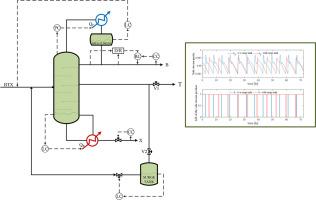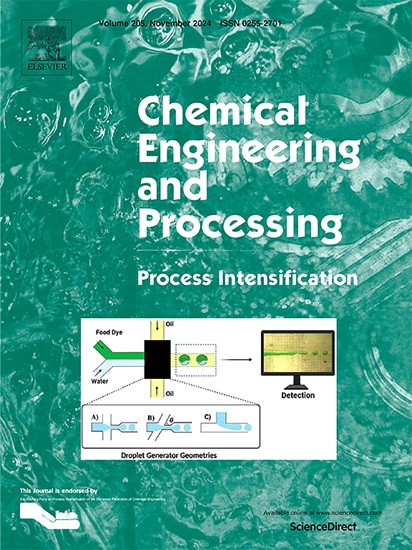Dynamic modeling and modification of ternary semicontinuous distillation without a middle vessel for improved controllability and energy performance
IF 3.8
3区 工程技术
Q3 ENERGY & FUELS
Chemical Engineering and Processing - Process Intensification
Pub Date : 2024-10-16
DOI:10.1016/j.cep.2024.110021
引用次数: 0
Abstract
Ternary distillation conventionally requires two sequential columns. In a process intensification technique, the second column is eliminated by operating the first column in a cyclic manner, where the intermediate component is withdrawn periodically from a side stream. This process, called semicontinuous distillation (SCD) without a middle vessel, can lower the separation costs significantly. However, it exhibits controllability challenges due to the periodic recycling of the side stream. In this work, the process controllability is improved by adding a surge tank in the side stream recycle path. The modification increases significantly the process robustness without changing the operation recipe. Also, the modified SCD can lower maintenance costs as the manipulated variables experience milder oscillations. Moreover, it is shown to have a faster startup than the original design, yielding about 13 % energy saving per feed processed and processing about 25 % more feed during the startup compared with the original design. The case studies show the surge tank volume should be chosen based on the trade-off between attenuation of undesired disturbances and slow-down of desired control actions. Also presented in this article is detailed hybrid discrete-continuous dynamic modeling of the SCD and how the resulting model is implemented in the open-source software OpenModelica.

对无中间容器的三元半连续蒸馏进行动态建模和改进,以提高可控性和能效
传统的三元蒸馏需要两个连续的塔。在一种工艺强化技术中,通过循环操作第一个蒸馏塔来省去第二个蒸馏塔,中间组分会定期从侧流中抽出。这种工艺被称为无中间容器的半连续蒸馏 (SCD),可显著降低分离成本。然而,由于侧流的周期性回收,它在可控性方面存在挑战。在这项工作中,通过在侧流循环路径中增加一个缓冲罐,提高了工艺的可控性。这种改进在不改变操作配方的情况下,大大提高了工艺的稳健性。此外,修改后的 SCD 还能降低维护成本,因为所操纵的变量会出现较轻微的振荡。此外,与原始设计相比,它的启动速度更快,每处理一次进料可节省约 13% 的能源,启动期间可多处理约 25% 的进料。案例研究表明,在选择缓冲罐容积时,应在衰减不希望出现的干扰和减慢所需的控制动作之间进行权衡。本文还详细介绍了 SCD 的离散-连续混合动态建模,以及如何在开源软件 OpenModelica 中实施由此产生的模型。
本文章由计算机程序翻译,如有差异,请以英文原文为准。
求助全文
约1分钟内获得全文
求助全文
来源期刊
CiteScore
7.80
自引率
9.30%
发文量
408
审稿时长
49 days
期刊介绍:
Chemical Engineering and Processing: Process Intensification is intended for practicing researchers in industry and academia, working in the field of Process Engineering and related to the subject of Process Intensification.Articles published in the Journal demonstrate how novel discoveries, developments and theories in the field of Process Engineering and in particular Process Intensification may be used for analysis and design of innovative equipment and processing methods with substantially improved sustainability, efficiency and environmental performance.

 求助内容:
求助内容: 应助结果提醒方式:
应助结果提醒方式:


